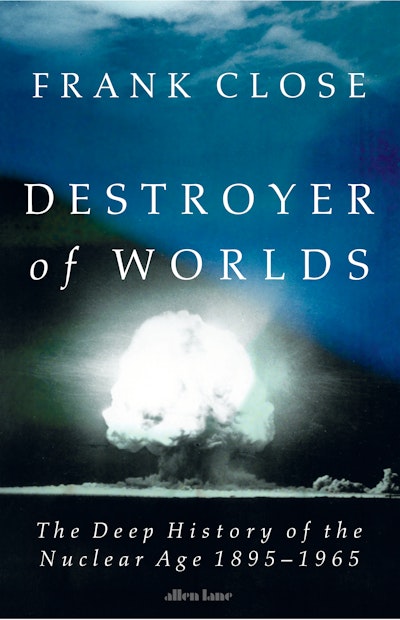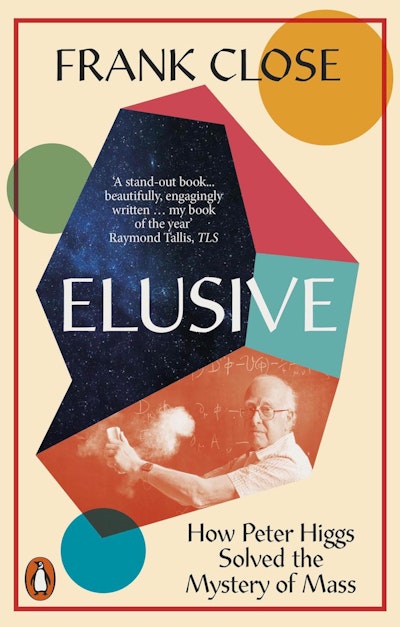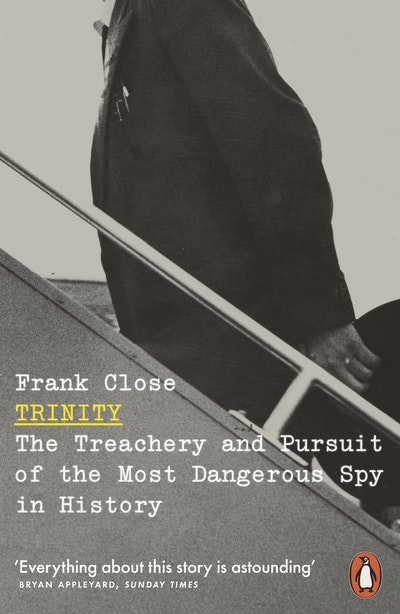- Published: 23 September 2025
- ISBN: 9780241700860
- Imprint: Allen Lane
- Format: Hardback
- Pages: 336
- RRP: $55.00
Destroyer of Worlds
The deep history of the nuclear age: 1895-1965
- Published: 23 September 2025
- ISBN: 9780241700860
- Imprint: Allen Lane
- Format: Hardback
- Pages: 336
- RRP: $55.00
Destroyer of Worlds is a cogent, detailed account of one of history's brightest and darkest chapters, in which amazing scientific insights into atoms and their nuclei coincided with fascism and world-wide conflict. Frank Close shows us how the initial dreams of beneficial atomic energy were transmuted, with frightening speed, into nightmares. Amidst our current enthusiasm for artificial intelligence and other game-changing technologies, this book offers us all a stern warning
Matt Strassler, author of <i>Waves in an Impossible Sea</i>
Kinetic, dramatic, and compulsively readable, Destroyer of Worlds follows dozens of astounding scientific discoveries that led to the development of nuclear weapons. In powerful, plain language, Close connects humanity’s unstoppable scientific curiosity to our species’ strange willingness to visit existential threats upon ourselves
Patchen Barss, author of <i>The Impossible Man</i>
If you enjoyed the movie "Oppenheimer," you will be thrilled by Frank Close’s Destroyer of Worlds. With a knack for explaining the history of nuclear energy in simple terms, Close takes us to the "rooms where it happened," revealing the struggles, mistakes, and triumphs that led from the discovery of radioactivity to up to the nuclear age
Robert Cahn, co-author of <i>Grace in All Simplicity</i>
Once again, Frank Close explains sophisticated science in a way that anyone can understand, and tells a gripping story in the process: how a smudge in a photographic plate in March 1896 led, almost inexorably, to the development of the most terrifying weapons of war ever created. Along the way we are introduced to the fascinating characters who propelled this drama, people like Roentgen and Becquerel, Rutherford and the Curies, Bohr and Einstein, Fermi and Szilard, Teller and Oppenheimer, and a host of other geniuses whose scientific curiosity led mankind down a dark path indeed. For those interested in how the quest to understand radioactivity and the atomic nucleus led to the development of the hydrogen bomb, this book is a great place to start
David Schwartz, author of <i>The Last Man Who Knew Everything</i>
Close recounts the story that led from the scientific discovery of the perplexing phenomenon of radioactivity at the end of the 19th century to potentially world-destroying weapons six decades later ... a splendid history
Philip Ball, New World
Stirring ... Close's ensemble drama is a powerful corrective to the myth of the solitary genius. An eminent theoretical physicist, he walks us step-by-step through what he calls the 'Third Industrial Revolution', [shining] a light on the bustling cast of scientists whose 50-year pursuit of knowledge led ineluctably to the atomic bomb. The depth of Close's knowledge throws up surprises even if you know the territory ... he convenes these fascinating personalities deftly and has an abundant supply of thrills, tragedies and gratifying trivia.
Dorian Lynskey, Spectator
Close writes with elegance and lucidity about the resulting experiments and investigations [and] the breakthroughs that led to the atom bomb [so that] the sense of wonderment and awe that drives the quest shines through. Close also turns the spotlight on figures often forgotten, such as Ettore Majorana, a young Sicilian physicist, whom Fermi rated as a genius to rank alongside Newton and who did much to unravel the mysteries of atomic structure.
Jonathan Ford, Financial Times
Destroyer of Worlds tries to live up to the jeopardy of its title by attempting to solve the mystery of Ettore Majorana [and] shows how it took many great minds to bring the nuclear genie out of its lamp. Close's main focus is the female physicists who escaped their share of the nuclear limelight.
George Bass, New Scientist
Frank Close’s Destroyer of Worlds begins, in a flash-forwarding prelude, with the famous Trinity test of the first atomic bomb. It ends, more or less, with the detonation of the true destroyers of worlds, the thermonuclear H-bombs that made Trinity look like a Roman candle. In between is the entire history of nuclear science—and a growing sense of tragedy. Starting with Henri Becquerel’s discovery of radioactivity, in the late 19th century, and continuing with the work of researchers such as Marie Curie, Ernest Rutherford, Lise Meitner and Enrico Fermi, Close’s is a magisterial account of an exciting—and often courageous—area of scientific endeavour.
Peter Hoskin, Prospect
A persuasive account… admirable in its honesty. Close is fortunate with his cast of characters, and the fact that their overlapping lives often played out as a dark soap opera… Close explains it better than anyone ever has – and maybe even could
Peter Hoskin, Engelsberg Ideas
Anyone left intellectually unsated by recent Oppenheimer-mania will relish Destroyer of Worlds (Allen Lane), in which physicist Frank Close ventures beyond the Manhattan project to tell the gripping story of the nuclear age. Beginning with the 19th-century discovery of a smudge on a photographic plate, Close spins a history that, via Hiroshima, Nagasaki and a lot of nimbly explained physics, closes seven decades later with the Tsar Bomba, a Soviet weapon detonated in 1961.
Anjana Ahuja, Guardian, Best Science and Nature Books of the Year




